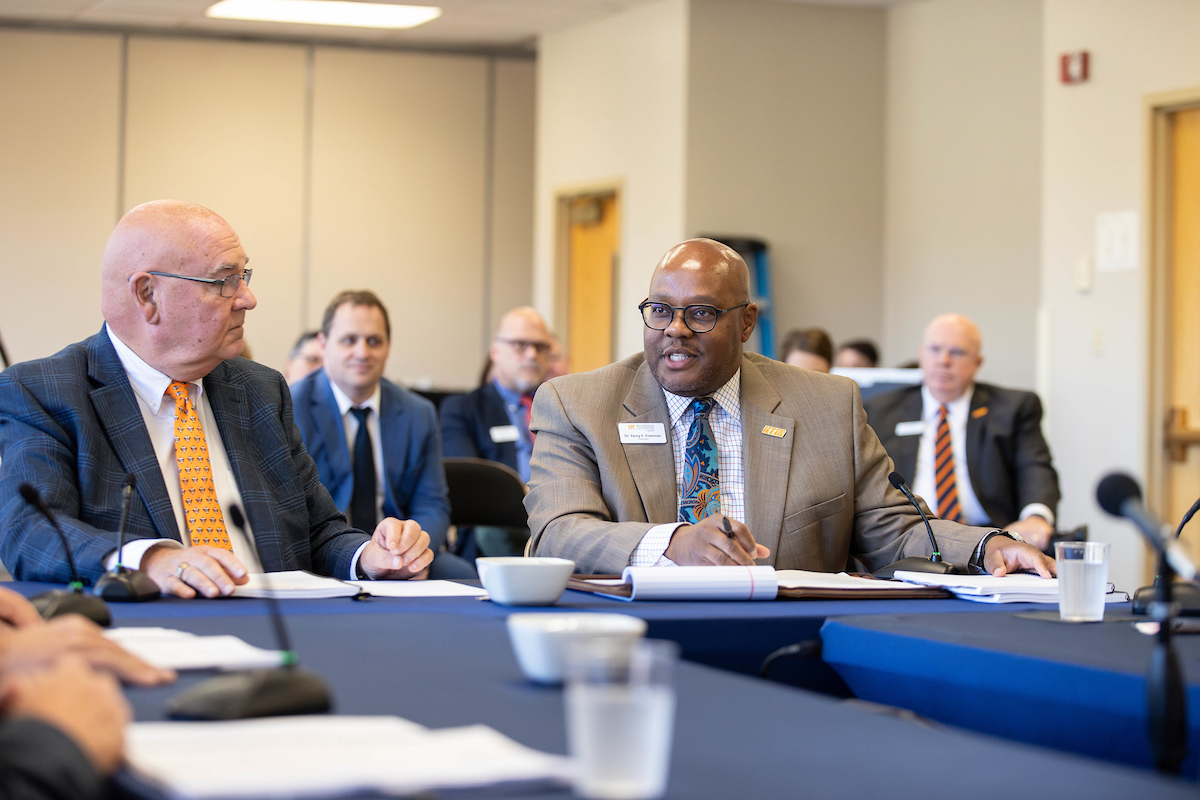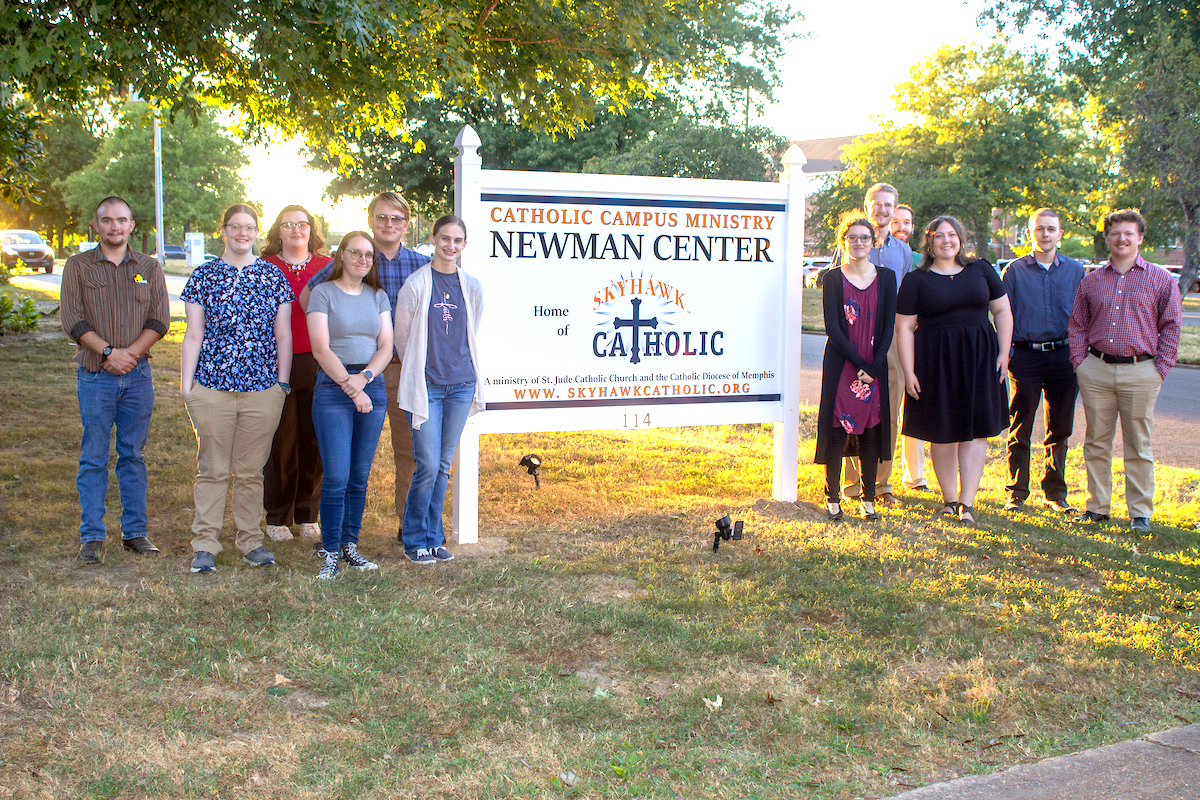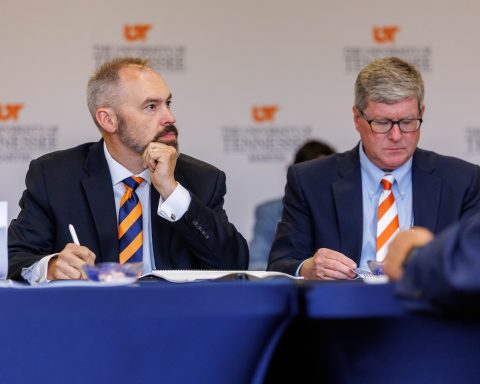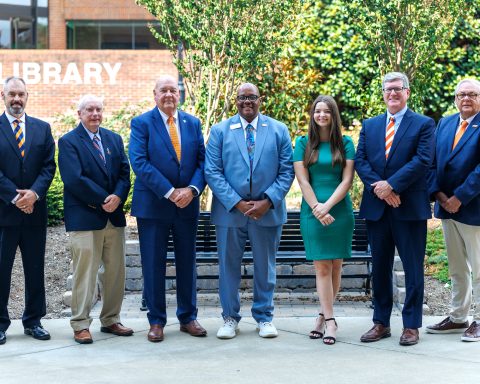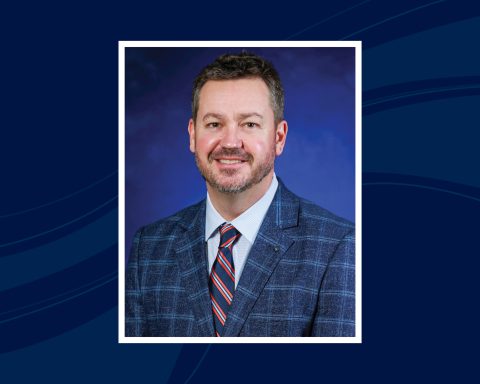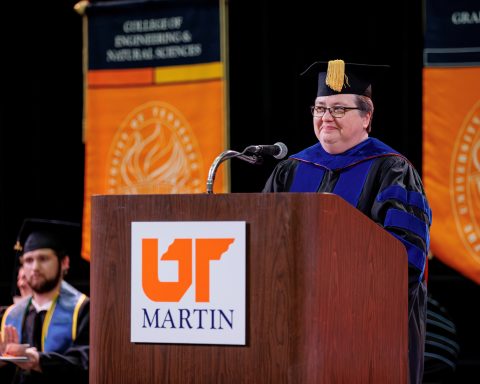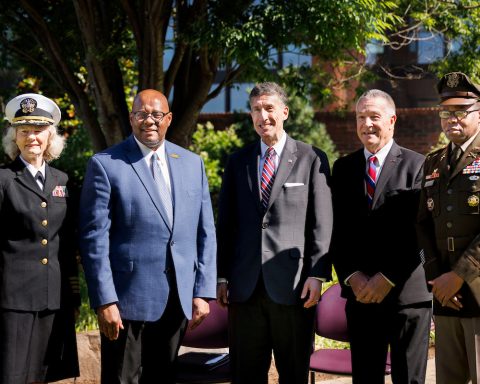Details about an 8% fall enrollment increase for the University of Tennessee at Martin were among the reports heard by the UT Martin Advisory Board during its fall meeting Friday, Sept. 20, in the Boling University Center. Other presentations covered university housing, the university’s fiscal year-end budget and progress on the new UT Martin Strategic Plan. Among those attending the meeting was Dr. Steven Gentile, Tennessee Higher Education Commission executive director.
Advisory boards were created for each University of Tennessee campus under the UT FOCUS Act passed during Gov. Bill Haslam’s administration. Board members are appointed by the governor, confirmed by the Tennessee General Assembly, and advise the chancellors, UT president and UT Board of Trustees on matters related to the university campuses.
Dr. Andy Lewter, vice chancellor for student affairs, reported the highest occupancy this fall in a decade for university housing. Students living on campus total 1,961 students with more returning students living on campus than first-time residents. The second annual Welcome Home Picnic brought 1,400 students, parents, faculty and staff together Aug. 22 following move-in earlier that day. He also reported increased participation in sororities and fraternities, which had declined during the pandemic years.
The university’s current and anticipated future enrollment growth will increase demand for housing. Lewter explained that the university is exploring ways to house more students as facilities age and enrollment grows to 10,000 students by 2030. Of the anticipated 10,000 UT Martin students by 2030, Lewter estimated that 5,000 students could physically be in Martin, and the university would potentially house about half of those. Beyond current university plans to replace Browning Hall in the next several years and other housing initiatives, Lewter cited the need for more non-university living space.
“We need some help from off-campus, too,” he said. “So, we’re going to need some properties to possibly be built here in the community, and we need that for our younger faculty and staff who are needing apartments to live in, and we’re also possibly needing that for some of our students.” He added that the university will work toward “contracting with off-campus partners” for housing needs beyond what the campus can address.
Destin Tucker, assistant vice chancellor for enrollment services, followed Lewter’s presentation and reported that the 8% fall semester increase translates to 7,507 students attending the university, the highest university enrollment since 2012. This compares to 6,950 students who registered in fall 2023. The freshman class totaled 1,220 students, up from 1,118 first-year students who enrolled last fall.
Other increases included a 15.7% jump in undergraduate transfer students and 19.2% more dual-enrollment students compared to fall 2023. Dual enrollment courses allow high school juniors and seniors to take college courses and earn both high school and college credit. Also, the university’s full-time equivalent enrollment grew 6.2% from 5,215 to 5,540. FTE is determined by dividing undergraduate student credit hours by 15 and graduate hours by 12.
Graduate student numbers showed one of the few declines at 690 students enrolled for fall 2024 compared to 707 graduate students enrolled last fall. Tucker expects this number to improve as a new master’s degree in social work is planned and improved ways to admit and communicate with prospective graduate students begin.
UT Martin fall enrollment includes students from 89 of the 95 Tennessee counties along with students from 40 states and 20 countries, including Tennessee and the U.S.
Strong student retention, which indicates students who remain enrolled year to year at the university, also contributed to the higher enrollment and is the highest in 25 years. First-time, full-time freshman retention is 77%, which is seven percentage points higher since 2020. In total, the undergraduate retention rate is 84.9%, which is a three-point increase from fall 2023 and is the highest overall undergraduate retention number since 2018.
“Retention is truly a campus-wide effort. Everything that goes on in the classroom, when they (students) walk into a building and are greeted, when they go into the library and need study space, need help finding their materials … So many people have a hand in this,” she said.
In other reports, Petra McPhearson, senior vice chancellor for finance and administration, told advisory board members that the university closed the 2024 fiscal year in the black by $4 million, which included both operating and auxiliary revenue and an increase in grants and contracts revenue. Tuition and mandatory fees declined largely because only students who enroll in face-to-face classes pay those fees, but other revenue and savings offset those declines.“We’re fortunate to have the investments that we need to support our campus and support our academic programs,” McPhearson said. “So, this is our ‘why.’ We’re here for the students, and it’s important that we provide the support services that we need … to support the growth as we move to 10,000 students by 2030.”
Dr. Philip Acree Cavalier, provost and senior vice chancellor for academic affairs, reported that progress continues on the university’s new strategic plan. Cavalier and Dr. Andy Lewter are leading the plan’s creation, which began in May. The plan will be announced at the UT Board of Trustees meeting in February 2025 in Martin. “It’s a fairly tight timeline,” he told the board. “We’ve hit every deadline so far, so I think we’re on track.”
Cavalier said the plan will focus on the four themes outlined by Chancellor Yancy Freeman that address people, places, partnerships and achievement. Five working groups each will be led by two faculty or staff members who will identify five strategies for achieving the strategic plan goals that have emerged from these themes. Completion of this work is expected in November.
“I feel very strongly that this group will lead those committees and bring us five strategies in each case that we’ll be excited about and figure out how we’re going to accomplish those strategies in the next five years,” Cavalier said.
Freeman closed the meeting by recognizing the work that helped to achieve this fall’s strong enrollment and retention growth.
“It is difficult – and I’ve done enrollment management for 30 years – it is difficult to move 1% in particular on retention. But to have three-and-half percent is phenomenal,” he said.
Looking ahead, he wants the university to grow its international student population to 5% of total enrollment. A new international student recruitment plan will drive that goal.
Achieving enrollment goals will take a university-wide effort, and Freeman wants to focus on the people and processes that make UT Martin work. He wants to add a staff council to represent staff concerns and complement already existing groups that represent faculty and students and use the group as an additional “sounding board.”
“We have to invest in the people who are working here,” he said. “They are the reason why our students are here and why they continue to come back.”
Also at work is a “functional areas group” that’s examining policies and processes to remove barriers for students trying to navigate the university, register for classes and earn their degrees. “It sometimes means changing some of our policies,” he said of registration. “A lot of times it means changing some of our processes, but we will get there.”
Partnerships are one of Freeman’s strategic plan themes, and he noted recent partnerships with Tennessee Colleges of Applied Technology that allow students to earn credits toward a UT Martin degree. He also announced that the new Springfield Center established in cooperation with Volunteer State Community College in Middle Tennessee was recently approved by the Tennessee Higher Education Commission as UT Martin’s sixth regional center.
Also referencing partnerships, he reported that the university’s TEST Hub, a cooperative workspace and innovation hub with Dyersburg State Community College and the TCAT-McKenzie will break ground in spring or early summer 2025 and be built on the west side of the main campus.
Art Sparks of Union City, who was unanimously reelected advisory board chair earlier in the meeting, closed the meeting by urging each board member to “do everything you can” to support the university and the work that is happening.
Members of the UT Martin Advisory Board are Hal Bynum, Dresden; Chayil Watkins, Rossville, student representative; Dan Strasser, Chapel Hill, alumni representative; Art Sparks, Union City; Dr. Dan McDonough, faculty representative, Martin; Johnny Woolfolk, Jackson; and Dr. Tonya Reynoldson, Camden. The full meeting is archived for viewing and associated meeting materials are available at www.utm.edu/advisoryboard.
The UTM Advisory Board’s next meeting will be Jan. 24, 2025, in the Boling University Center.
PHOTO: Board Chair Art Sparks (left) and university Chancellor Yancy Freeman are shown at the UTM Advisory Board meeting Sept. 20. Sparks of Union City was unanimously reelected board chair during the meeting.

